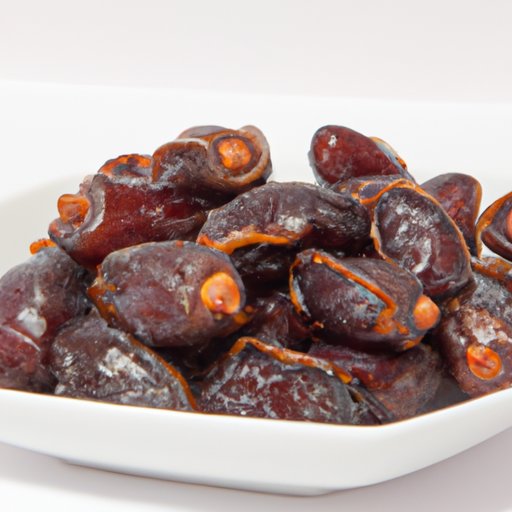Introduction
Medjool dates are a type of fruit that has been cultivated in the Middle East for centuries. Known for their sweet caramel-like flavor, medjool dates are becoming increasingly popular in many parts of the world due to their unique taste and potential health benefits. But are medjool dates really healthy? This article will explore the nutritional properties of medjool dates and discuss how they can be incorporated into a healthy diet.

Review of the Health Benefits of Medjool Dates
Medjool dates are packed with essential vitamins and minerals. They’re an excellent source of antioxidants, which help fight free radicals and reduce inflammation in the body. Studies have also shown that medjool dates contain high levels of dietary fiber, which can help improve digestion and regulate blood sugar levels.
In addition to these benefits, medjool dates are also rich in important vitamins and minerals such as potassium, magnesium, phosphorus, iron, and zinc. These nutrients are essential for proper cell function, energy production, and overall health.

Exploring the Nutritional Profile of Medjool Dates
Medjool dates are high in calories, with one date containing approximately 66 calories. However, they are low in fat, with less than 0.5 grams per date. They are also a good source of carbohydrates, providing 18.9 grams per date.
Medjool dates are also high in natural sugars, with 16.4 grams per date. While this may seem like a lot, it’s important to remember that natural sugars are not the same as added sugars, which should be avoided as much as possible. Natural sugars are found naturally in fruits and vegetables, and are not considered to be unhealthy when consumed in moderation.
Comparing Medjool Dates to Other Types of Dried Fruits
When compared to other types of dried fruits, medjool dates are a healthier option. For example, raisins are higher in calories (129 calories per 1/4 cup) and contain more sugar (29.3 grams per 1/4 cup). Similarly, apricots are higher in calories (105 calories per 1/4 cup) and contain more sugar (25.7 grams per 1/4 cup). Prunes are slightly lower in calories (97 calories per 1/4 cup) but still contain more sugar (21.6 grams per 1/4 cup).
How to Incorporate Medjool Dates into a Healthy Diet
Medjool dates are incredibly versatile and can be easily incorporated into a healthy diet. They make a great snack on their own or can be added to salads and smoothies. They can also be used as a natural sweetener in baking or as a topping for oatmeal or yogurt.

Recipes Featuring Medjool Dates for Optimal Health
There are many different recipes that feature medjool dates for optimal health. For example, date-nut bars are a delicious and nutritious snack that is easy to make and requires just five ingredients. Date-stuffed baked apples are another great way to incorporate medjool dates into your diet, and are a healthier alternative to traditional apple pies. Finally, date-almond energy balls are a perfect pre- or post-workout snack that are high in protein and fiber.
Conclusion
Medjool dates are a delicious and nutritious snack that can be easily incorporated into any healthy diet. They are packed with essential vitamins and minerals and are an excellent source of antioxidants, dietary fiber, and natural sugars. When compared to other types of dried fruits, medjool dates are a healthier option. There are many recipes featuring medjool dates that can be used to promote optimal health.
(Note: Is this article not meeting your expectations? Do you have knowledge or insights to share? Unlock new opportunities and expand your reach by joining our authors team. Click Registration to join us and share your expertise with our readers.)
